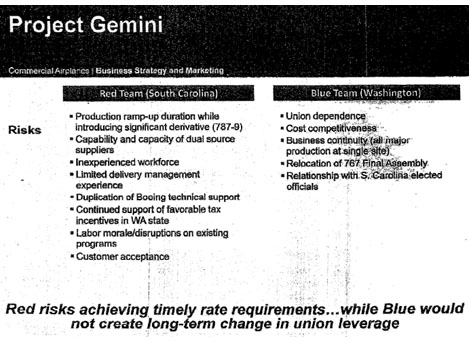LOCAL
Boeing documents: S.C. option had highest risks, costs
The following news release was distributed today by Machinists District 751.
SEATTLE (Sept. 23) — Newly uncovered Boeing Co. documents show the company’s own executives believed that “Project Gemini” — their plan to establish a second 787 line in South Carolina — was their highest-risk option for their new Dreamliner jet and the one most likely to fail.
At the same time, a report by a public interest research group shows that Boeing follows a deliberate strategy of boosting profits by squeezing taxpayers for handouts in South Carolina, Washington and other states.
The Project Gemini documents and the report on Boeing’s tax strategy were released by Machinists Union District Lodge 751 on Friday at the International Labor Communicators Association’s convention in Seattle.
“The Project Gemini documents prove what we’ve suspected all along — that Boeing moved to Charleston to punish our members for exercising their union rights,” said Connie Kelliher, a spokeswoman for District 751.
“In addition, the report on Boeing’s tax strategy shows the company considers state and local governments to be cash cows to be milked at every opportunity,” she said. “We’ve certainly seen that, with the 787 incentives in both Washington and South Carolina.”
The Project Gemini documents are part of the evidence subpoenaed by the National Labor Relations Board as part of its complaint against Boeing. The federal law enforcement agency alleges that Boeing is moving 787 work to Charleston in retaliation for strikes by Machinists District 751 in 2005 and 2008.
The documents disclosed Friday were first presented to Boeing’s board of directors in April, August and October 2009. They show that:
- Boeing Commercial Airplanes executives from Puget Sound considered Project Gemini to be the highest-risk option they studied, with the highest likelihood of failure and the most-serious consequences should failure occur.
- Even if successful, the cost of Project Gemini would have a long-term “negative impact to 787 program profitability,” the executives warned. The new buildings would cost between $1.5 billion and $2 billion, they said — “significantly greater” than the cost of keeping the line in Everett.
- The new Charleston workers would not be as productive as those in Everett, increasing the likelihood of missed deliveries, they warned. That would mean payments of more late fees to angry customers that have already demanded billions of dollars in compensation after three years of delays.
- Finally, Puget Sound executives feared that having separate 787 lines 3,000 miles apart would delay introduction of the 787-9, a new larger Dreamliner. They warned of “skill dilution” with managers and assembly workers spread between two sites, as well as the risk of “management distraction.”
Boeing’s Cash Cow
The report on Boeing’s tax strategy was written by the Institute for Wisconsin’s Future, which proclaims “there is no large company in America better at avoiding taxes than Boeing.”
It includes information from a workshop Boeing put on for other corporations in 2004, titled “Turning Your State Government Relations Department from a Money Pit into a Cash Cow.”
According to the Institute, Boeing has been spectacularly successful in extracting tax benefits from at least seven states and also local governments:
- In 2003, Washington promised a $3 billion tax break for Boeing and its suppliers in return for guarantees the company would build 787s in the state;
- Boeing built its new 787 plant in South Carolina after “extracting” a 63 percent discount on its local property taxes in 2009, plus reimbursement for half of the remaining taxes it agreed to pay; and
- Boeing moved into its new Chicago headquarters in 2001 after obtaining $60 million worth of state and local tax breaks.
One way Boeing does that is to pit states against each other in a competitive bidding process, the Institute reported. That’s what happened in 2009, when Boeing’s decision to move the second 787 line out of Puget Sound sparked a bidding frenzy.
South Carolina officials offered a deal originally estimated at $450 million, but months after it was signed, they admitted that even they didn’t know how much they’d given away. A local newspaper calculated the total handouts at least $900 million, with a final value “well above $1 billion.”
As Boeing profits from the handouts, the governments that grant them are struggling to fund basic services. South Carolina, for example, has run budget deficits of more than $1 billion in each of the past two years, forcing deep cuts in public health, education, universities, aid to seniors and disabled people and job-training programs (except for Boeing’s $33 million training pact).
“The combination of demands for low taxes, low wages and high-cost infrastructure is unsustainable,” the report said. “Boeing’s model for the new global corporation is an America without a middle class.”






